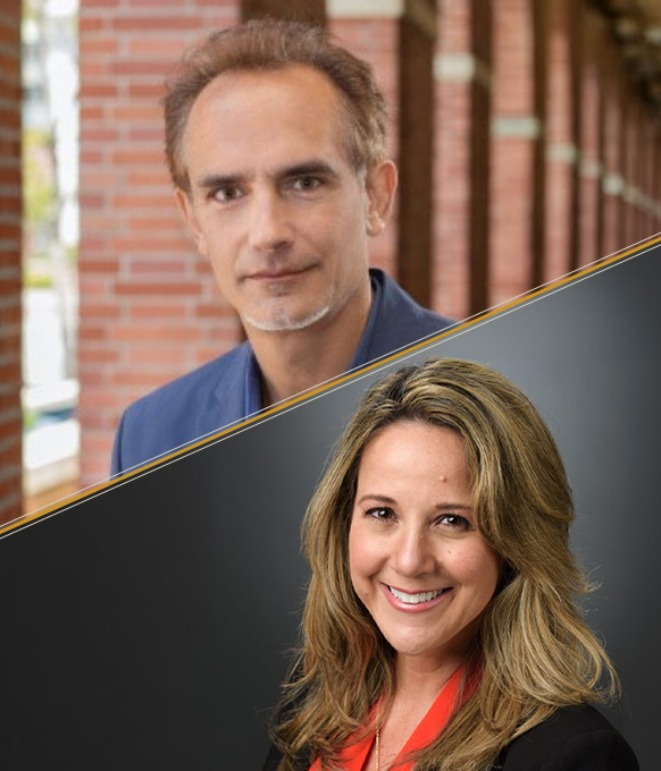
Artificial Intelligence Can Help New CEOs Drive Innovation
New research shows AI can be a strategic catalyst for innovation and creativity, especially during leadership transition.
Industry Insiders Teach Entrepreneurship in Entertainment Industry
Industry Insiders Teach Entrepreneurship in Entertainment Industry
Professors Sherry Gunther and Michael Napoliello are providing students a behind-the-scenes look into the endless entrepreneurial possibilities in the ever-changing entertainment industry.

Michael Napoliello and Sherry Gunther are teaching students about entrepreneurship in entertainment.
[USC Photos]
Ten years ago, few people could have predicted where Hollywood would be now — recovering from a pandemic and battling a job shortage following two historic strikes — let alone where it’ll be in ten more. Yet, as Marshall Professors and Hollywood veterans Sherry Gunther and Michael Napoliello like to remind their students at the Lloyd Greif Center for Entrepreneurial Studies: with uncertainty comes opportunity.
Adjunct Professors of Entrepreneurship Michael Napoliello and Sherry Gunther are teaching their students the skills to seize these opportunities and mold what’s next in a turbulent industry. With their respective classes, BAEP 475 Entertainment Entrepreneurship and BAEP 575 Entrepreneurship in the Media and Entertainment Industry, Napoliello and Gunther are using their years of experience in Hollywood to prepare students for the endless entrepreneurial possibilities across the film, television, and media landscape.
“In this industry, where it survives and thrives on every level is entrepreneurial,” Napoliello said. “For example, writing a pilot for a TV series is an entrepreneurial endeavor. I’m taking a risk that my words will spark interest and I’m investing my time.”
It’s not just writers who have this mindset, according to Napoliello. Producers, directors, craftspeople, actors, and many other industry workers are entrepreneurs in their own right, betting on themselves in an industry built on self-starters and changemakers.
“An entrepreneur must think, ‘What’s next?’” Napoliello said. “If you’re doing what’s happening right now, you’re a day late.”
Gunther’s and Napoliello’s courses prepare students to answer these questions with hands-on, experiential exercises and projects. At the end of Gunther’s BAEP 575, for example, students must design, develop, and critique an entertainment-based venture that can exist in a dynamic market.
Over the years, Gunther has watched class projects evolve in step with Hollywood. From AR/VR proposals to new streaming networks to bold artificial intelligence integration, her students are pushing the limits of what’s possible and what’s next. Their pitches may seem off the beaten path, but as Gunther points out, the ideas proposed in her class are the future of Hollywood.
“These discussions are what shape each other’s points of view and vision of what the opportunities are in the future,” Gunther said.
Napoliello’s BAEP 475 class has the benefit of being open to all USC undergraduates. Whether it’s artists working to learn the business side of the industry or business students hoping to learn the artistic angles, his course is filled with a diverse range of perspectives and goals.
While Gunther instructs the graduate level course and Napoliello teaches undergraduates, they both have a similar approach to their courses. Each has traveled unique paths in the industry that date back decades, often using those experiences to inform their lessons and provide students a behind-the-scenes glimpse of the business.
I’m most proud to say that some of my students have even become colleagues of mine in the business. They’ve got the speed of youth and the ambition of launching their careers. Who knows: they may be my boss one day.
— Michael Napoliello
Adjunct Professor of Entrepreneurship
Like many Marshall entrepreneurs, Napoliello co-founded U.S. Marketing & Promotions in his college dorm, and it has since grown into one of the leading promotional agencies in the country. Currently, he serves as a board member and producer at Radar Pictures, known for films like The Last Samurai, Spring Breakers, and Jumanji.
Gunther has worn nearly every hat in Hollywood, working her way up from production manager to an entrepreneur and Emmy-winning producer on animated shows such as The Simpsons, Family Guy, and various Turner Entertainment programs. Today, Gunther is juggling multiple projects, including producing Zack Snyder’s Twilight of the Gods, which is due to air on Netflix September 19.
Through these firsthand experiences, the professors lend their students exclusive access to real-world knowledge and connections. In fact, Gunther and Napoliello often use their connections to introduce industry speakers with valuable insights.
“I bring in speakers who are working in the field, who are relevant, who have a point of view, who can talk to what’s going on from their perspective and where the industry is headed,” Gunther said.
The guests’ contributions extend beyond the classroom. Many of them continue to mentor Gunther’s and Napoliello’s students as they embark on their careers.
Additionally, Marshall undergraduates and graduates are uniquely well-positioned to brainstorm solutions to the entertainment industry’s most pressing problems. In a business built on “who you know,” USC’s close proximity to studios, networks, and agencies allows students access to Hollywood’s major power players, including countless Trojan alumni.
Yet, the professors know that networking is only half the battle. Like the industry itself, the courses evolve year to year along with the opportunity for innovation. Napoliello observed that huge studios and entertainment conglomerates are less likely to take a risk than small, nimble ventures eager to break onto the scene and lead the market.
Napoliello and Gunther push their students to think beyond the present, to see into the future or, more precisely, create that future.
“Opportunities in the future always have to do with what the youngest generation is thinking and doing,” Gunther said. “We’re not basing the next evolution on what 50/60-year-olds are doing. We’re basing it on what kids are doing today … That’s where we’re at right now and that’s where we’re headed because that’s who’s going to lead in the next 20 years.”
Now, after over a decade of teaching, Napoliello and Gunther are witnessing their students’ success first hand.
“I’m most proud to say that some of my students have even become colleagues of mine in the business,” Napoliello said. “They’ve got the speed of youth and the ambition to launch their careers. Who knows? They may be my boss one day.”
RELATED
Artificial Intelligence Can Help New CEOs Drive Innovation
New research shows AI can be a strategic catalyst for innovation and creativity, especially during leadership transition.
Dean’s Dialogue: SpaceX CFO Bret Johnsen on Space Innovation and the Trojan Network
Bret Johnsen, a Leventhal alumnus, spoke with Marshall Dean Geoffrey Garrett about SpaceX’s cutting-edge projects, U.S. manufacturing, and the value of a USC education.
Marshall Faculty Publications, Awards, and Honors: October 2025
We are proud to highlight the many accomplishments of Marshall’s exceptional faculty recognized for recently accepted and published research and achievements in their field.
Sports Leaders Discuss Athlete Business Savvy, LA28, and Student Learning Opportunities at Next Level Sports Conference
Roger Goodell, Maria Sharapova, Chris Paul, and Casey Wasserman spoke at the second annual NLS Conference, hosted by USC Marshall and USC Annenberg.
AI Bottlenecks: A Q&A with Georgios Petropoulos on Obstacles to an Economic Boom
Assistant Professor Georgios Petropoulos discusses his research on artificial intelligence bottlenecks and the factors preventing the technology from catalyzing an economic surge.